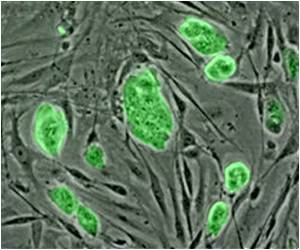Scientists at the Hereditary Disease Foundation Symposium, claim good advances in their research towards Huntington's disease and related disorders.
Scientists have assembled to report encouraging and innovative strategies and probable future therapies for Huntington's disease and related disorders.
The Hereditary Disease Foundation convened HD 2006: Changes, Advances and Good News (CAG)n in Cambridge, Massachusetts, hosting a group of emeritus scientists world over have assembled for 4 days from 10th to 14th of August for an intense discussion, debate to help create future therapies for Huntington's disease and related disorders.Almost 400 scientists met together to share their latest discoveries. "The synergy, innovation and enthusiastic collaboration fostered by this gathering of dedicated scientists brings out the best in all of us and will hopefully lead us to a lifesaving cure for Huntington's disease!" stated Nancy S. Wexler, Ph.D., President of the Hereditary Disease Foundation and Higgins Professor of Neuropsychology in the Departments of Neurology and Psychiatry of the College of Physicians and Surgeons at Columbia University, in her opening remarks. "We are gratified that so many excellent scientists from around the world participated and presented their latest, cutting-edge and unpublished data to advance the search for a cure for Huntington's disease," said Carl D. Johnson, Ph.D., and Executive Director for Science of the Hereditary Disease Foundation.
Topics covered:
* Unraveling the cause of Huntington's disease
* Novel therapeutic strategies
* Advances in RNA interference therapy
* Discovering new drugs
* Clinical trials
Participants described the meeting as "the definitive Huntington's disease meeting in the world for this year."
Highlights of the meeting included the following: An extremely promising innovative strategy presented involves tackling the problem at its very source. DNA in the gene causing Huntington's disease expands too much. This abnormal DNA is copied faithfully into RNA. The RNA then makes a protein, which is also abnormal. This abnormal protein wreaks havoc and eventually is the cause of cellular disability and death.
Advertisement
Participants also heard the very promising results of cell transplant therapy. People with Huntington's disease in France received cellular transplants into their brains, which then grew and made connections. The initial pilot phases of this research were so encouraging, even after a follow-up of 8 years, which the research has expanded to include 60 or more HD patients in Europe. These clinical trials are being conducted in such a rigorous fashion that they will enable us to learn a great deal about the future of cell replacement therapy.
Participants were introduced to a new initiative being undertaken by the Hereditary Disease Foundation in collaboration with the European Huntington's Disease Network (EHDN). This initiative involves the development of new guidelines for the care of people with HD, based on the evidence of carefully controlled clinical trials - whenever possible. A follow-up workshop on Monday, August 14, 2006, to develop the guidelines' procedures was hosted by the HDF, EHDN and Sir Michael D. Rawlins, Chair of the United Kingdom's National Institute of Health and Clinical Excellence (NICE).
The Hereditary Disease Foundation's biennial meeting once again brings together an international cadre of junior and senior scientists who comprise the top experts and drivers of the field. It draws both long time HD researchers and investigators just entering the field. The meeting is a magnet for all the key players. Collaborations are formed which catalyse the research of the future.
Researchers from universities and government organizations from around the world attended, including large delegations from Harvard Medical School and Massachusetts General Hospital, Massachusetts Institute of Technology, Johns Hopkins University, the Universities of California at Los Angeles, San Francisco and Irvine and the University of British Columbia as well as smaller groups from nearly 50 other university and research centres around the world. In addition there were participants from biotech and pharmaceutical companies including, Novartis, Merck, Alnylam, Medtronics, Cambridge Laboratories, Trophos, EnVivo, CombinatoRx, Metabolon, Psychogenics, BioFocus, Cambria and Addgene.
The Hereditary Disease Foundation gratefully received support for the meeting from Alnylam Pharmaceuticals, Inc., Cambridge Laboratories Ltd, EnVivo Pharmaceuticals, Inc., Fisher Scientific International, Inc., Genzyme Corporation, Merck & Co., Inc., Novartis Institutes for BioMedical Research, Inc., Pfizer Inc., Prestwick Pharmaceuticals, Inc., Sirna Therapeutics, Inc. and Vertex Pharmaceuticals, Inc.
Huntington's disease is a fatal neurological illness causing involuntary movements, severe emotional disturbance and cognitive decline. Huntington's disease usually strikes in mid-life, in the thirties or forties, although it can also attack children and the elderly. There is no treatment to halt the inexorable progression, which leads to death after ten to twenty-five years. Each child of a parent with Huntington's disease has a 50% risk of inheriting the illness. It they inherit the abnormal gene and live a normal life span, the disease invariably appears. In the United States, the prevalence of the disease is about 10 people per 100,000 people - about 30,000 symptomatic people in all. There are another 150,000 individuals at risk. This means that approximately 100,000 people may need therapy daily if taking a drug to prevent the disease from ever occurring - a preferred mode of treatment.
Because Huntington's disease destroys so many different capabilities - intellectual, physical and emotional - the insights gained from research on this illness are relevant to the understanding of many other diseases, including schizophrenia, manic depression, Alzheimer's disease, Lou Gehrig's disease, Parkinson's disease and cancer. By focusing on Huntington's disease as a model, the Hereditary Disease Foundation targets neurological and genetic functions relevant to a broad spectrum of disorders.
The Hereditary Disease Foundation (http://www.hdfoundation.org) was founded in 1968 and is dedicated to finding a cure for Huntington's disease and related disorders. The HDF's unique combination of creating and funding innovative, strategic research has sparked an explosion of knowledge in the scientific field. Breakthroughs by the HDF's scientists include the landmark discovery of the Huntington's disease marker in 1983 and the gene itself in 1993. The Hereditary Disease Foundation and its scientists also helped to launch the Human Genome Project. Collectively, they have created a vast, international, collaborative effort that is markedly shortening the journey towards a cure.
The Hereditary Disease Foundation's research programs include grants and John J. Wasmuth postdoctoral fellowships. Special awards, selected by the Scientific Advisory Board of the Hereditary Disease Foundation, include the Milton Wexler Postdoctoral Fellowship Award and the Lieberman Award. A centrepiece of the Foundation is the program of interdisciplinary Mary Jennifer Selznick workshops held several times during the year. These small, informal, dynamic workshops foster dialogue among researchers from a variety of fields, who come without prepared lectures or slides to converse across disciplinary borders.
Source: EurekAlert.





